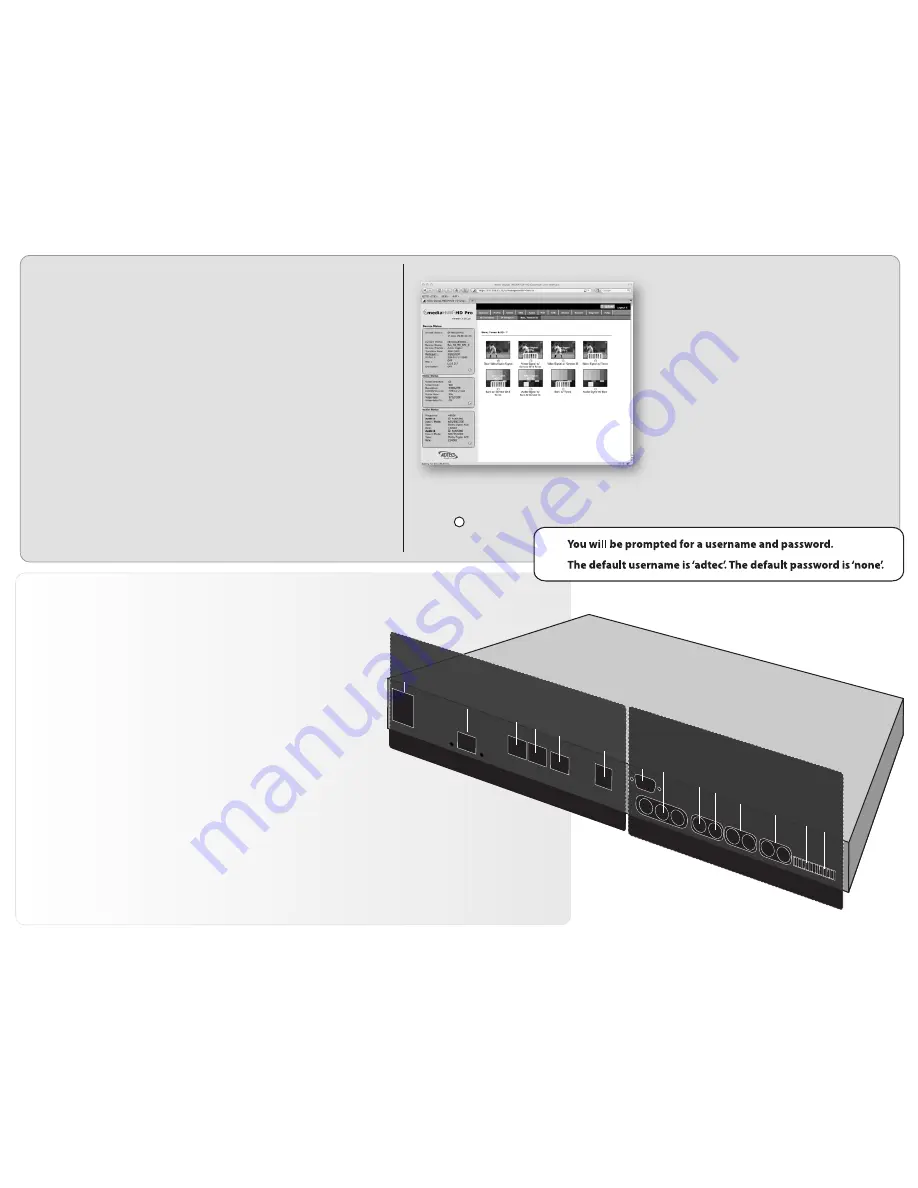
To begin, you will need to connect to your mediaHUB Pro
via ethernet directly, or by adding the mediaHUB Pro to your local
area network.The default address for all Adtec devices is
192.168.10.48.
To connect directly to the device, make sure that your
computer and the device have IP addresses within the same IP
class range (ex. 192.168.10.48 for the device and 192.168.10.49
for your computer). If you need to change the IP address of the
device, this can be done via the front panel, System > Network
menu. Using a CAT 5 crossover cable, connect one end to your
computer and the other to the Ethernet port found on the
processor section of the back panel. (Some computers can auto
negotiate the connection and a crossover may not be necessary.)
To add the device to a LAN, connect a standard CAT 5
Ethernet cable to your network router and then to the Ethernet
port on the back of the device. If your network is DHCP enabled
and you prefer that over a static IP, you can turn on DHCP for the
device via the front panel, System > Network menu.
Adtec Digital Technical Support: 615.256.6619 www.adtecinc.com
06.09.2011
Getting Connected
Web-Based Control Application
Adtec Digital has adopted zero-configuration
networking technology, streamlining the setup and
configuration processes for our products. The use of this
technology enables automatic discovery of Adtec devices
and services on an IP network. Used in tandem with the
web-based control and configuration applications we can
now provide 1-click access to any device.
By using the built-in Bonjour
©
locater in Apple's
©
Safari
©
browser or the plug-ins readily available for IE
©
or
Firefox
©
browsers, users can locate all of the Adtec
devices on a network by referencing the serial number on
the back of the device. Clicking on the unit in the
Bonjour
©
list will re-route you to a login page. If you do
not wish to use Bonjour, you can reach the device’s web
application by pointing your browser to the IP Address of
the device. Ex. http://192.168.10.48.
The left panel of the application will report current status in real-time while the right panel tabs will
allow you to configure your device. Additional hints regarding configuration options can be found by clicking on
the hints buttons
associated with each
field or group of fields.
?
C
OM2
C
OM1
E
ther
net
USB 2.0
PROCESSOR
ENCODER
In
Out
In
Out
GPIO
ASI Out X 3
C
VBS In
SDI In
A
ES A
udio 1/2
AES A
udio 3/4
A
nalo
g A
udio 1/2
A
nalo
g A
udio 3/4
Processor
.................................................................................................................
Power
AC Power - Standard 3 pin plug (70-240 VAC 50 - 60 Hz)
GigE
MPEG2 SPTS over IP with SMPTE 2022 forward error correction
COM2
API Serial Communication Interface
COM1
Serial Port Used for Troubleshooting
Ethernet
10/100 base T Ethernet interface
USB 2.0
Not Currently Supported
Encoder
.....................................................................................................................
GPIO
Tally and Control Port
ASI OUT
75 Ohm source ASI x3 per EN500083-9
CVBS In (analog)
75 Ohm terminated NTSC or PAL D1 Composite Video Input
SDI In
75 Ohm terminated Input, SMPTE
(SD)
259/
(HD)
292 Video and
(SD)
272/
(HD)
299 Audio
AES Audio
75 Ohm AES Audio Input & 75 Ohm Compressed Audio Output (1/2 & 3/4 )
Analog Audio In
600 Ohm Balanced Analog Audio Input (1/2 & 3/4)
P
o
w
er
G
igE



















